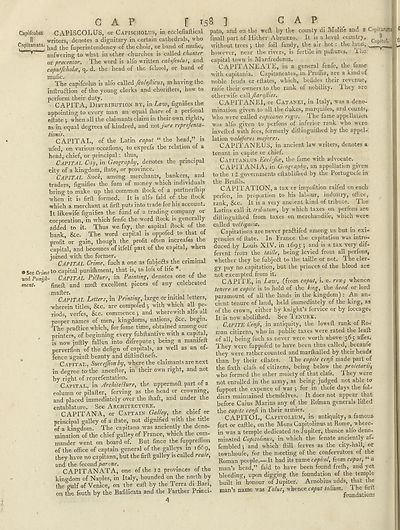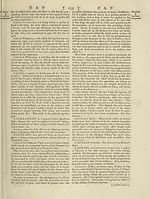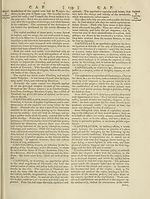Encyclopaedia Britannica, or, a Dictionary of arts, sciences, and miscellaneous literature : enlarged and improved. Illustrated with nearly six hundred engravings > Volume 5, BUR-CHI
(172) Page 158
Download files
Complete book:
Individual page:
Thumbnail gallery: Grid view | List view

CAP [ 158 ]
Capifcolus CAPISCOLUS, or CapiscHOLUS, in ecclefiaftical pato. and on th
II writers, denotes a dignitary in certain cathedrals, who
Capitanata. t^c fUperintendency of the choir, or band of mufic,
T anfwering to what in other churches is called chanter
or precentor. The word is alio written calnfcolus, and
caputfcholce, q. d. the head of the fchool, or band of
muiic. . .
The capifcolus is alfo called fcolq/licus, as having the
inftruflion of the young clerks and chorifters, how to
perform their duty.
CAPITA, Distribution by, in Law, fignifies the
appointing to every man an equal fhare of a perfonal
eitate •, when all the claimants claim in their own rights,
as in equal degrees of kindred, and not jure reprejenta-
tionis.
CAPITAL, of the Latin caput “ the head,” is
ufed, on various occaiions, to exprefs the relation of a
head, chief, or principal: thus, • • 1
CAPITAL C’ti/, in Geography, denotes the principal
city of a kingdom, date, or province.
CAPITAL Stock, among merchants, bankers, and
traders, fignifies the fum of money which individuals
bring to make up the common dock of a partnerlhip
when it is fird formed. It is alio laid of the dock
which a merchant at fird puts into trade for his account,
It likewife lignifies the fund of a trading company or
corporation, in which fenfe the word dock is generally
added to it. Thus we fay, the capital dock of the
bank, &c. The word capital is oppofed to that of
profit or gain, though the profit often increafes the
capital, and becomes of itfelf part of the capital, when
joined with the former. a • • 1
CAPITAL Crime, fuch a one as fubjefts the criminal
»See Crime t° capital punifhment, that is, to lofs of life *.
and Punijb- CAPITAL PiBure, in Painting, denotes one of the
fined and mod excellent pieces of any celebrated
CAPITAL Letters, in Printing, large or initial letters,
wdierein titles, &c. are compofed} with which all pe¬
riods, verfes, &c. commence; and wherewith alfo all
proper names of men$ kingdoms, nations, &c. begin.
The pra&ice which, for fome time, obtained among our
printers, of beginning every fubdantive with a capital,
is now judly fallen ‘into difrepute; being a manifed
perverfion of the defign of capitals, as well as an of-
fence againd beauty and didin£tnefs.
Capital, Succejjionby, where the claimants are next
in degree to the ancedor, in their own right, and not
by right of reprefentation.
Capital, in ArchiteBure, the uppermod part of a
column or pilader, ferving as the head or crowning,
and placed immediately over the fhaft, and under the
entablature. See Architecture.
CAPITANA, or Captain Galley, the chief or
principal galley of a date, not dignified with the title
of a kingdom. The capitana was anciently the deno¬
mination of the chief galley of France, which the com¬
mander went on board of. But fince the fuppredion
of the office of captain general of the galleys in 1669,
they have no capitana, but the fird galley is called reale,
and the {cconA parotie.
CAPITANATA, one of the 12 provinces of the
kingdom of Naples, in Italy, bounded on the north by
the gulf of Venice, on the ead by the Terra di Bari,
on the fouth by the Bafilicata and the Farther Prnici-
4
CAP
ment.
wed by the county di Moliie and a
fmall part of Hither Abruzzo. It is a level country,
without trees j the foil fandy, the air hot : the land,
however, near the rivers, is fertile in padures. ilie
capital town is Manfredonia.
CAPITANEATE, in a general fenfe, the fame
with eapitania. Capitaneates, in Pruffia, are a kind of
noble feuds cr edates, which, befides their^ revenue,
raife their owners to the rank of nobility. I hey are
otherwife call JlaroJlies.
CAPITANEI, or Catanei, in Italy, was a deno¬
mination given to all the dukes, marquifes, and counts,
who were called capitanei regis. I he lame appellation
was alfo given to perfons of inferior rank who were
inveded with fees, formerly didinguilhed by the appel¬
lation valafores majores.
CAP1TANEU3, in ancient law writers, denotes a
tenant in capite or chief.
Capitaneus Eccljice, the fame with advocate.
CAPITANIA, in Geography, an appellation given
to the 1 2 governments edablilhed by the Portuguefe in
the Brafils.
CAPITATION, a tax or impofition raifed on each
perfon, in proportion to his labour, induitry, office,
rank, &c. It is a very ancient kind of tribute. The
Latins call it tributum, by which taxes on perfons are
didinguilhed from taxes on merchandne, which were
called veBigaiia*
Capitations are never praftifed among us but in exi¬
gencies of date. In France the capitation was intro¬
duced by Louis XIV. in 1695 j and is a tax very dif¬
ferent from the taille, being levied from all perfons,
whether they be fubjett to the taille or not. The cler¬
gy pay no capitation, but the princes ol the blood are
not exempted from it.
CAPITE, in Law, (from caput, i. e. rex; whence
tenere in capite is to hold of the king, the head or lord
paramount of all the lands in the kingdom) : An an¬
cient tenure of land, held immediately of the king, as
of the crown, either by knight’s fervice or by foccage.
It is now abolilhed. See 1 ENURE.
CAPITE Cenji, in antiquity, the lowed rank of Ro¬
man citizens, who in public taxes were rated the lead
of all, being fuch as never were worth above 365 afles.
They were fuppofed to have been thus called, becaufe
they were rather counted and mardialled by their heads
than by their edates. The capite cenfi made part of
the fixth clals of citizens, being below the proietarii,
who formed the other moiety of that clafs. They were
not enrolled in the army, as being judged not able to
fupport the expence of war ; for in thole days the fol-
diers maintained themfelves. It does not appear that
before Caius Marius any of the Roman generals lided
the capite cenfi in their armies.
CAPITOL, Cafitolium, in antiquity, a famous-
fort or cadle, on the Mons Capitolinus at Rome, where¬
in was a temple dedicated to Jupiter, thence alfo deno¬
minated Capitolinus, in which the fenate anciently af-
fembled and which dill ferves as the city-hall, or
townhoufe, for the meeting of the cOnfervators of the
Roman people.—It had its name capvol, from caput, “ a
man’s head,” faid to have been found frelh, and yet
bleeding, upon digging the foundation of the temple
built in honour of Jupiter. Arnobius adds, that the
man’s name was Tolus} caput tolium. I he firlt
foundations
Capitanstfl
II
Capitol.
Capifcolus CAPISCOLUS, or CapiscHOLUS, in ecclefiaftical pato. and on th
II writers, denotes a dignitary in certain cathedrals, who
Capitanata. t^c fUperintendency of the choir, or band of mufic,
T anfwering to what in other churches is called chanter
or precentor. The word is alio written calnfcolus, and
caputfcholce, q. d. the head of the fchool, or band of
muiic. . .
The capifcolus is alfo called fcolq/licus, as having the
inftruflion of the young clerks and chorifters, how to
perform their duty.
CAPITA, Distribution by, in Law, fignifies the
appointing to every man an equal fhare of a perfonal
eitate •, when all the claimants claim in their own rights,
as in equal degrees of kindred, and not jure reprejenta-
tionis.
CAPITAL, of the Latin caput “ the head,” is
ufed, on various occaiions, to exprefs the relation of a
head, chief, or principal: thus, • • 1
CAPITAL C’ti/, in Geography, denotes the principal
city of a kingdom, date, or province.
CAPITAL Stock, among merchants, bankers, and
traders, fignifies the fum of money which individuals
bring to make up the common dock of a partnerlhip
when it is fird formed. It is alio laid of the dock
which a merchant at fird puts into trade for his account,
It likewife lignifies the fund of a trading company or
corporation, in which fenfe the word dock is generally
added to it. Thus we fay, the capital dock of the
bank, &c. The word capital is oppofed to that of
profit or gain, though the profit often increafes the
capital, and becomes of itfelf part of the capital, when
joined with the former. a • • 1
CAPITAL Crime, fuch a one as fubjefts the criminal
»See Crime t° capital punifhment, that is, to lofs of life *.
and Punijb- CAPITAL PiBure, in Painting, denotes one of the
fined and mod excellent pieces of any celebrated
CAPITAL Letters, in Printing, large or initial letters,
wdierein titles, &c. are compofed} with which all pe¬
riods, verfes, &c. commence; and wherewith alfo all
proper names of men$ kingdoms, nations, &c. begin.
The pra&ice which, for fome time, obtained among our
printers, of beginning every fubdantive with a capital,
is now judly fallen ‘into difrepute; being a manifed
perverfion of the defign of capitals, as well as an of-
fence againd beauty and didin£tnefs.
Capital, Succejjionby, where the claimants are next
in degree to the ancedor, in their own right, and not
by right of reprefentation.
Capital, in ArchiteBure, the uppermod part of a
column or pilader, ferving as the head or crowning,
and placed immediately over the fhaft, and under the
entablature. See Architecture.
CAPITANA, or Captain Galley, the chief or
principal galley of a date, not dignified with the title
of a kingdom. The capitana was anciently the deno¬
mination of the chief galley of France, which the com¬
mander went on board of. But fince the fuppredion
of the office of captain general of the galleys in 1669,
they have no capitana, but the fird galley is called reale,
and the {cconA parotie.
CAPITANATA, one of the 12 provinces of the
kingdom of Naples, in Italy, bounded on the north by
the gulf of Venice, on the ead by the Terra di Bari,
on the fouth by the Bafilicata and the Farther Prnici-
4
CAP
ment.
wed by the county di Moliie and a
fmall part of Hither Abruzzo. It is a level country,
without trees j the foil fandy, the air hot : the land,
however, near the rivers, is fertile in padures. ilie
capital town is Manfredonia.
CAPITANEATE, in a general fenfe, the fame
with eapitania. Capitaneates, in Pruffia, are a kind of
noble feuds cr edates, which, befides their^ revenue,
raife their owners to the rank of nobility. I hey are
otherwife call JlaroJlies.
CAPITANEI, or Catanei, in Italy, was a deno¬
mination given to all the dukes, marquifes, and counts,
who were called capitanei regis. I he lame appellation
was alfo given to perfons of inferior rank who were
inveded with fees, formerly didinguilhed by the appel¬
lation valafores majores.
CAP1TANEU3, in ancient law writers, denotes a
tenant in capite or chief.
Capitaneus Eccljice, the fame with advocate.
CAPITANIA, in Geography, an appellation given
to the 1 2 governments edablilhed by the Portuguefe in
the Brafils.
CAPITATION, a tax or impofition raifed on each
perfon, in proportion to his labour, induitry, office,
rank, &c. It is a very ancient kind of tribute. The
Latins call it tributum, by which taxes on perfons are
didinguilhed from taxes on merchandne, which were
called veBigaiia*
Capitations are never praftifed among us but in exi¬
gencies of date. In France the capitation was intro¬
duced by Louis XIV. in 1695 j and is a tax very dif¬
ferent from the taille, being levied from all perfons,
whether they be fubjett to the taille or not. The cler¬
gy pay no capitation, but the princes ol the blood are
not exempted from it.
CAPITE, in Law, (from caput, i. e. rex; whence
tenere in capite is to hold of the king, the head or lord
paramount of all the lands in the kingdom) : An an¬
cient tenure of land, held immediately of the king, as
of the crown, either by knight’s fervice or by foccage.
It is now abolilhed. See 1 ENURE.
CAPITE Cenji, in antiquity, the lowed rank of Ro¬
man citizens, who in public taxes were rated the lead
of all, being fuch as never were worth above 365 afles.
They were fuppofed to have been thus called, becaufe
they were rather counted and mardialled by their heads
than by their edates. The capite cenfi made part of
the fixth clals of citizens, being below the proietarii,
who formed the other moiety of that clafs. They were
not enrolled in the army, as being judged not able to
fupport the expence of war ; for in thole days the fol-
diers maintained themfelves. It does not appear that
before Caius Marius any of the Roman generals lided
the capite cenfi in their armies.
CAPITOL, Cafitolium, in antiquity, a famous-
fort or cadle, on the Mons Capitolinus at Rome, where¬
in was a temple dedicated to Jupiter, thence alfo deno¬
minated Capitolinus, in which the fenate anciently af-
fembled and which dill ferves as the city-hall, or
townhoufe, for the meeting of the cOnfervators of the
Roman people.—It had its name capvol, from caput, “ a
man’s head,” faid to have been found frelh, and yet
bleeding, upon digging the foundation of the temple
built in honour of Jupiter. Arnobius adds, that the
man’s name was Tolus} caput tolium. I he firlt
foundations
Capitanstfl
II
Capitol.
Set display mode to:
![]() Universal Viewer |
Universal Viewer | ![]() Mirador |
Large image | Transcription
Mirador |
Large image | Transcription
Images and transcriptions on this page, including medium image downloads, may be used under the Creative Commons Attribution 4.0 International Licence unless otherwise stated. ![]()
| Permanent URL | https://digital.nls.uk/192986505 |
|---|
| Attribution and copyright: |
|
|---|
| Description | Ten editions of 'Encyclopaedia Britannica', issued from 1768-1903, in 231 volumes. Originally issued in 100 weekly parts (3 volumes) between 1768 and 1771 by publishers: Colin Macfarquhar and Andrew Bell (Edinburgh); editor: William Smellie: engraver: Andrew Bell. Expanded editions in the 19th century featured more volumes and contributions from leading experts in their fields. Managed and published in Edinburgh up to the 9th edition (25 volumes, from 1875-1889); the 10th edition (1902-1903) re-issued the 9th edition, with 11 supplementary volumes. |
|---|---|
| Additional NLS resources: |
|

